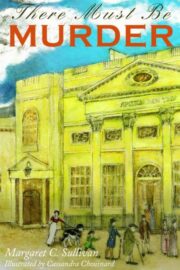“Forgive me, my sweet. It was a matter of professional interest. To continue: The silence, with which she listened to a proposal, dictated by love and despair, and enforced at a moment, when it seemed scarcely possible for her to oppose it; — when her heart was softened by the sorrows of a separation, that might be eternal, and her reason obscured by the illusions of love and terror, encouraged him to hope, that it would not be rejected. ‘Speak, my Emily!’ said Valancourt eagerly, ‘let me hear your voice, let me hear you confirm my fate.’ She spoke not; her cheek was cold, and her senses seemed to fail her, but she did not faint. To Valancourt’s terrified imagination she appeared to be dying; he called upon her name, rose to go to the chateau for assistance, and then, recollecting her situation, feared to go, or to leave her for a moment.”
Henry paused and glanced down at his wife’s rapt face. “I am glad that you are not of a swooning disposition, Cat. It must be terribly uncomfortable to have a girl forever falling insensible at inconvenient times, when she is most in need of all her faculties. It is well that you did not swoon when I offered you marriage. It might have put me off my mission.”
Catherine sighed in delight. “I assure you, I felt no inclination to swoon. That was the happiest moment of my life. I should not have liked to miss it because I was insensible.”
Henry smiled and gently touched her chin. “Then I am glad that you did not miss it.”
“It all seems so long ago, and yet we met for the first time just one year ago tonight! Henry, we should go back to Bath someday, present ourselves to Mr. King, and tell him what a successful introduction he made that night.”
“You would like to return to Bath?”
“Oh, yes! I think it would be very pleasant to return to Bath as a married woman. I should not have to worry about sitting out at the balls for lack of a partner.”
“Very well. I will write to my curate and enquire whether his schedule will allow me a fortnight in Bath, which we naturally shall extend to six weeks.”
Catherine’s delight with the scheme could not be expressed in words; fortunately, she needed no words to express that delight as admirably as her husband could desire.
Chapter Two
An Unexpected Meeting
The morning post contained a letter of great import; Henry paused only to issue a particular order to Matthew, and then went to share the news with Catherine.
He found her in the parsonage drawing-room, a very different apartment from that which she had seen on her first visit to Woodston. Fitted up with wallpaper and draperies in various shades of green and elegant new furniture, the room now indeed deserved the encomium of “the prettiest room in the world,” bestowed upon it by its then-future mistress.
Catherine did not immediately notice Henry’s entrance. She lay upon the sofa in an attitude that even the most generous observer might consider unladylike: her chin rested upon her hands, which were crossed over the arm of the sofa, and a slippered foot extended carelessly from a froth of petticoats as she gazed out of one of the big windows towards the little cottage beyond the orchard. She had been reading, but the forgotten book had dropped to the floor, where Ruby Begonia, the terrier most attached to Catherine, slept in a patch of sunlight. Henry wondered what made her smile so; his vanity did not extend to imagining that she was thinking of him.
He said her name; she started, and then laughed. “You have caught me daydreaming!” Ruby Begonia yawned, stretched, and jumped up to run to her master to have her ears scratched.
Catherine made as if to sit up, but he said, “Nay, my sweet, stay as you are. I should hate to lose sight of such a pretty ankle.”
“Henry!” she exclaimed in austere tones as she sat up and arranged her skirts demurely. She was accustomed to his teasing, but not yet to the liberties that a husband might take.
“Well, it is a very pretty ankle; but I suppose your scruples are as they should be. But that is not why I looked for you. The post has just arrived, including a letter from Naughton.” Mr. Naughton was Henry’s curate. They had been fellows together at Oxford until Henry took over the Woodston living. Mr. Naughton was content with the academic life, and had no thought of marriage; however, he had a widowed mother and unmarried sister to help support, and was happy to receive a yearly stipend in return for riding to Woodston on Sundays when the rector could not be present. “He is happy to take Sunday services for as long as necessary, so we are free to pursue our scheme for Bath.”


"There Must Be Murder" отзывы
Отзывы читателей о книге "There Must Be Murder". Читайте комментарии и мнения людей о произведении.
Понравилась книга? Поделитесь впечатлениями - оставьте Ваш отзыв и расскажите о книге "There Must Be Murder" друзьям в соцсетях.